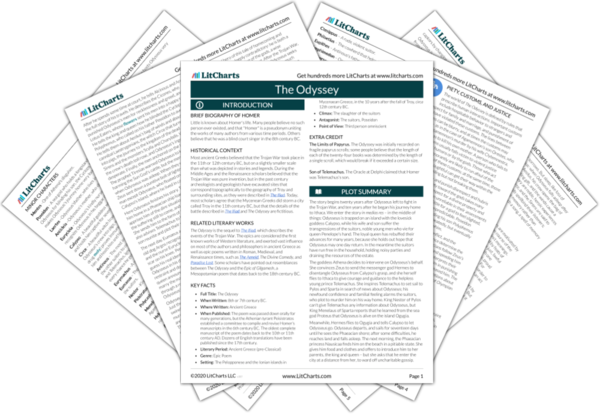Summary
Analysis
At dawn, Athena in the guise of Alcinous gathers people to the meeting grounds. When everyone arrives, Alcinous asks his people to bring a ship down to the sea and to find a crew of fifty-two men to transport Odysseus home; everyone else, he says, should gather to feast and celebrate. After everyone eats and drinks, the bard Demodocus sings about the battle between Odysseus and Achilles. The song moves Odysseus to tears. Though Odysseus hides his weeping under his cape, Alcinous notices the tears and urges the guests to move on to athletic competitions.
Just as Telemachus's tears reveal his identity to Menelaus, Odysseus's tears give him away to Alcinous. Though it benefits Odysseus to keep his identity hidden for the time being, it is honorable to weep for his dead comrades: he chooses honor, memory and grief over prudence, or perhaps the emotions or so strong he just can't hide them.
Themes
Everyone goes to the meeting grounds, where the strongest and most talented men get ready to compete. There is a footrace, followed by wrestling, jumping, and discus-throwing. Laodamas invites Odysseus to join the competition, but Odysseus declines, citing his long suffering and exhaustion. Broadsea, another champion, taunts Odysseus, claiming that he must not be skilled in athletics. This angers Odysseus, and he agrees to compete in the games.
He takes up the discus and throws it farther than any other competitor; Athena in disguise praises him and goads him on, and Odysseus boasts that he'll defeat anyone in the crowd in any sport – anyone except the king, because he is Odysseus's host. Alcinous admits that Odysseus's anger is reasonable, and tells him that the Phaeacians do not excel in all sports but are masters of racing and sailing, and feasting as well, and tells his court dancers to begin dancing.
Odysseus gets his fill of praise when he displays his strength. But even in his quest for athletic glory, Odysseus remembers to be polite to his host—he manages to both pursue honor and glory and to remain pious, a tricky task that many men who don't have Odysseus's skill at self-restrain fail to accomplish.
Themes
Meanwhile, the bard tells the story of Ares and Aphrodite. Aphrodite, the goddess of love, was unfaithful to her goldsmith husband Hephaestus with Ares, the god of war. When Hephaestus learned of the infidelity from Helios, the god of the sun, he created very fine gold chains that he slipped around the posts of Aphrodite's bed. He pretended to leave for a trip, and when Ares and Aphrodite went to bed together the near-invisible chains trapped them in each other's arms. When Hephaestus found them he cried out in anguish and all the gods gathered at his house, laughing at the unusual sight. The gods laughed because the crippled Hephaestus defeated the powerful god of war. Only Poseidon can convince Hephaestus to free Ares.
The story of Hephaestus and Ares is a variant on the parable of the weak outwitting the strong: though Hephaestus is crippled, he traps the mighty god of war. The gold chains represent the power of the mind: they are invisible and fine but infinitely strong. The episode resembles Odysseus's encounter with the Cyclops, whom he defeats using cunning despite his inferior strength. Though Hephaestus is similarly cunning, his physical weakness disqualifies him from glory, so the gods laugh at him instead of praising him.
Themes
Get the entire The Odyssey LitChart as a printable PDF.

After the story ends, Alcinous's best dancers perform, and Odysseus is amazed at their skill. Alcinous calls on the twelve peers of his kingdom to gather fine parting gifts for Odysseus. Broadsea gives Odysseus a beautiful sword to apologize for his taunts, and Odysseus graciously accepts the apology. Queen Arete gives Odysseus a trunk of fine clothes, and the maids give him a bath. He talks to Nausicaa, who teasingly reminds him that he owes her his life. Then he joins Alcinous at the table.
Though Odysseus has acted proudly and perhaps even vaingloriously, he generously praises the dancers and easily forgives his offender. He can turn it on and off; he has self-restraint, and acts appropriately at all times. Just as Calypso represented a temptation for Odysseus to give up his quest to return home, so does the flirting, beautiful, young Nausicaa, but Odysseus desire to return home is not swayed.
Themes
The bard Demodocus describes how the wooden horse full of Achaean soldiers secretly entered Troy, and how the Achaeans burst from the horse and defeated the Trojans; the bard mentions the particular courage of Odysseus and Menelaus. Odysseus cries to hear the tale. Only Alcinous notices his tears, and he asks the bard to stop singing. He urges Odysseus to finally reveal his identity and to explain his tears.
Odysseus grieves for the soldiers dead in battle, but perhaps he also grieves for his own past glory. The grief is a mixture of the honorable and the dishonorable (self-pity is not an honorable reason for tears). Though Alcinous asks the stranger his name, he has likely already guessed it.
Themes












